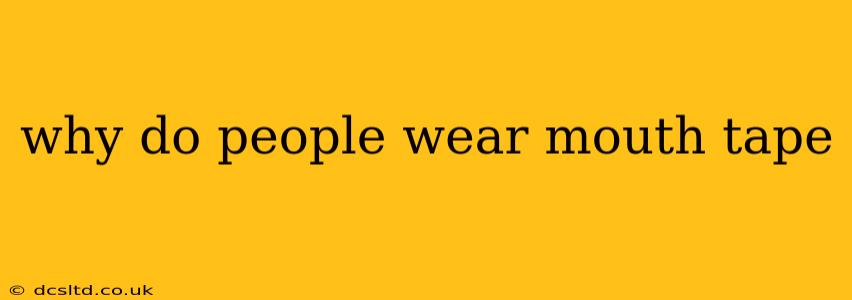Mouth taping, the practice of applying tape over your mouth while sleeping, has recently gained popularity as a purported method for improving sleep quality and overall health. While proponents claim numerous benefits, it's crucial to understand both the potential upsides and downsides before trying this technique. This article delves into the reasons people choose to wear mouth tape, examining the science and addressing common concerns.
What are the claimed benefits of mouth taping?
Many proponents suggest that mouth taping encourages nasal breathing, leading to several positive effects. They believe it can:
- Improve sleep quality: By promoting nasal breathing, it's argued that mouth taping can lead to deeper, more restful sleep. This is based on the idea that nasal breathing leads to better oxygen intake and reduced snoring.
- Reduce snoring and sleep apnea: Some believe it can alleviate snoring by preventing dry mouth and encouraging nasal airflow, potentially mitigating mild sleep apnea. However, it's crucial to note that mouth taping is not a treatment for severe sleep apnea and should not replace medical advice or treatment.
- Improve oxygen levels: Nasal breathing is believed to filter and warm the air, leading to better oxygenation of the blood.
- Reduce dry mouth: Mouth breathing during sleep can lead to dehydration and dry mouth. Taping the mouth encourages nasal breathing, potentially mitigating this issue.
Does mouth taping actually work?
The scientific evidence supporting the benefits of mouth taping is limited and often anecdotal. While some studies suggest a potential link between nasal breathing and improved sleep parameters, more rigorous research is needed to definitively prove the efficacy of mouth taping. The results can vary significantly based on individual factors such as nasal passage structure and pre-existing conditions.
What are the potential risks and downsides of mouth taping?
While generally considered a low-risk practice, potential downsides exist:
- Skin irritation: The adhesive used in the tape can cause irritation or allergic reactions in sensitive individuals.
- Difficulty breathing: If you have underlying respiratory conditions, mouth taping could make breathing difficult.
- Discomfort: Some people find the sensation of tape on their mouth uncomfortable and disruptive to sleep.
- Carbon dioxide retention: In theory, forcefully nasal breathing could potentially lead to increased carbon dioxide levels, although this requires further study. This risk is particularly relevant for individuals with pre-existing respiratory issues.
- Ineffective for severe sleep apnea: It's critical to understand that mouth taping is not a replacement for a CPAP machine or other medical treatments for sleep apnea.
Is mouth taping safe for everyone?
No, mouth taping is not suitable for everyone. Individuals with certain conditions, such as:
- Severe sleep apnea
- Asthma
- Chronic obstructive pulmonary disease (COPD)
- Other respiratory problems
should avoid mouth taping. It's vital to consult a doctor or sleep specialist before trying mouth taping, particularly if you have any pre-existing health conditions.
How should I use mouth tape?
If you decide to try mouth taping after consulting with your doctor, use a gentle, hypoallergenic medical tape designed for sensitive skin. Apply the tape lightly and ensure you can easily remove it without causing skin irritation. Start with short periods and gradually increase the duration as tolerated.
What are the alternatives to mouth taping for improving sleep?
Before resorting to mouth taping, consider other methods for improving sleep quality, such as:
- Improving your sleep hygiene: This includes establishing a regular sleep schedule, creating a relaxing bedtime routine, and ensuring your bedroom is dark, quiet, and cool.
- Treating underlying medical conditions: If you have sleep apnea or other respiratory issues, address them with appropriate medical treatment.
- Using nasal strips: Nasal strips can help open your nasal passages, making it easier to breathe through your nose.
Ultimately, the decision to use mouth tape is a personal one. It’s essential to weigh the potential benefits against the risks and consult a healthcare professional before incorporating it into your routine. While anecdotal evidence suggests benefits for some individuals, more conclusive research is needed to solidify its effectiveness and safety for the broader population.
